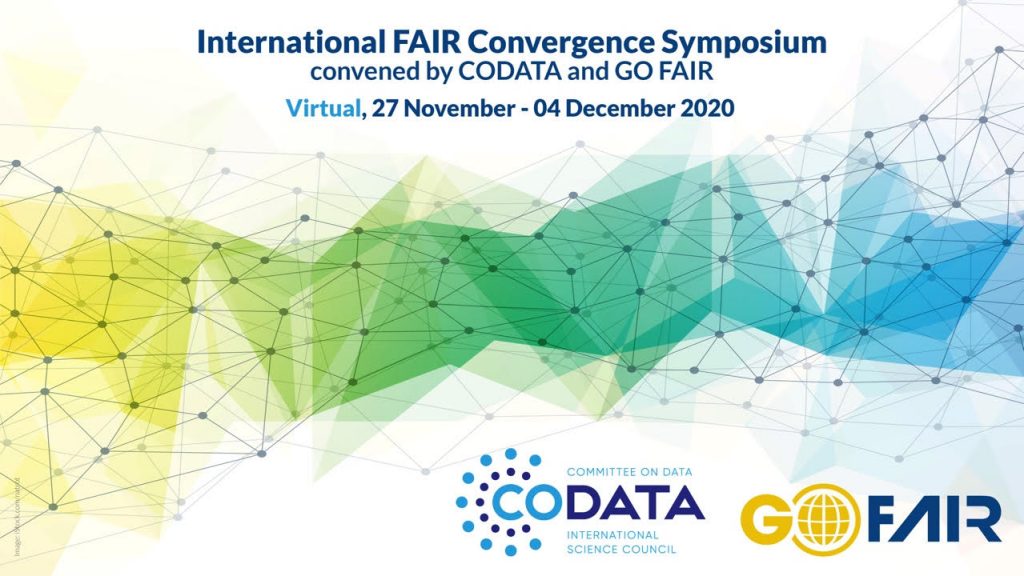International FAIR Convergence Symposium 2020
Register Now!
Register Now!
Registration for the FAIR Convergence Symposium and FREE access to all the sessions is now available at https://bit.ly/FAIRCONVERGE1 (use code FAIRCONVERGE1)
The FULL Programme can be viewed in the Cvent Platform or at https://conference.codata.org/FAIRconvergence2020/programme/
There is also a programme overview at http://bit.ly/FAIRSymposium_ProgrammeGrid
About the FAIR Convergence Symposium
About the FAIR Convergence Symposium
The International FAIR Convergence Symposium is organised by CODATA and GO FAIR. It will take place entirely virtually on 27 November and 30 November-4 December 2020. It is free to register.
This event will provide a unique forum for advancing international and cross-domain convergence around FAIR. The two internationally recognized organisations will convene a global community with an interest in combining data across domains for a host of research issues – including major global challenges, such as those relating to the SDGs or the COVID-19 pandemic. Outcomes will directly inform the CODATA Decadal Programme ‘Making data work for cross-domain grand challenges’ and the GO FAIR community’s convergence towards bottom-up development of the Internet of FAIR data and services globally.
The outcomes will address fundamental issues, such as an improved alignment with parallel and emerging data initiatives around the world and lessons learned during the current crisis (virus outbreak) in relation to international research data sharing and the role of FAIR. The approach in many sessions will be detailed and technical, resulting in recommendations, consensus for action and draft implementations.
Participation is FREE and open to ALL researchers, data experts, funders, and science policy makers.
Themes
Themes
All topics related to issues, challenges, convergence and consensus-building around FAIR are in scope. Four primary themes are highlighted below. Examples of particular interest are listed under each of the themes, but proposals on other topics relating to the four themes are welcome:
1. CRISIS REDUCTION AND RESPONSE (learning from COVID-19 outbreak)
- Virus Outbreak Data Network
- COVID-19 initiatives on data exchange
- Balancing public good and individual freedom in disaster data
- Disaster Risk Reduction
- Infectious Disease (including (meta)data collection, description, analysis, modelling, etc.)
- Applying lessons from COVID-19 to other hazards
2. FAIR specifications
- Semantic interoperability
- FAIR vocabularies, FAIR metadata
- Certification of FAIR services (repositories, process)
- Legal challenges to tackle
- Systems analysis
- Core tools for cross-domain interoperability
- FAIR data objects applications
3. FAIR society
- FAIR for SDGs (including contributing to SDG data, scientific analysis of SDGs)
- Traditional knowledge, indigenous data and CARE
- Use cases of FAIR in business and industry
- Ethical dimensions of data, FAIR and open
- Smart, resilient and healthy cities
- Citizen science and the SDGs
- Policy monitoring: transportation, health, planning, and measuring economic impacts
4. Data stewardship: training and career opportunities
- Role of data stewardship centres in research institutions
- Data stewardship competences, skills and training
- Data stewardship career profiles and development
- Distributed learning on Federated Data train
Session types
The sessions will be 90 minutes. For each session there will be the opportunity for virtual, in person and mixed formats. Sessions will have facilitated remote presentations and participation, with technical support and can be broadcast and/or recorded (according to the wishes of participants and organisers).
The following parallel session types are suggested by the organisers.
- Paper sessions may include research papers, practice papers or a mixture of these. Paper presentations should be a minimum of 15 minutes; papers sessions should include a maximum of 4-5 papers and should leave sufficient time for discussion.
- Workshops, interactive practical sessions, structured discussions and/or demos. Different lengths than 90 minutes may be suggested and justified in the session proposal.
Session organisers should submit a proposal including a full description of the session.
- For a papers session there should be a compelling description of the session theme along with short abstracts of each presentation.
- For other session types the proposal should include a compelling description of the session theme, the session format, activity and outcomes, as well as any other information which will allow the proposal to be judged.
- It is the responsibility of session organisers to ensure appropriate thematic alignment of the content and invite proposals for papers or practical sessions and workshops to be included in the proposal.
The recommended total length of a session proposal is 1000-1200 words and should clearly communicate the vision of the session, its structure and desired objectives. A short bio of all speakers should be submitted together with the session proposal. Proposals for papers sessions should include short abstracts of each paper within this word limit.
Posters and Lightning Talks
We invite proposals for posters and lightning talks to appear in a dedicated session. Proposals for posters and lightning talks should be no more than 600 words and should address the themes of the symposium listed above.
DEADLINE for posters and lightning talks proposals is 31 October 2020.
Programme
The Symposium programme in virtual and in person format will be announced early in September.
It will include keynotes and/or plenary sessions introducing each of the four themes, parallel sessions of various formats (paper sessions, workshops, interactive practical sessions and demos) and a plenary poster session. A plenary panel discussion will close the second day of the Symposium. See also paragraph on session types above.
Important dates:
- 30 April: call for session proposals released
- 22 May: registration open
- 30 September: deadline for session proposals
- 31 October: deadline for posters and lightning talks submissions
- 27 November – 4 December: International FAIR Convergence Symposium
Organization
- Convenors:CODATA, GO FAIR
- Supporter / Local organiser: Ministry of Higher Education, Research and Innovation of the French Republic

